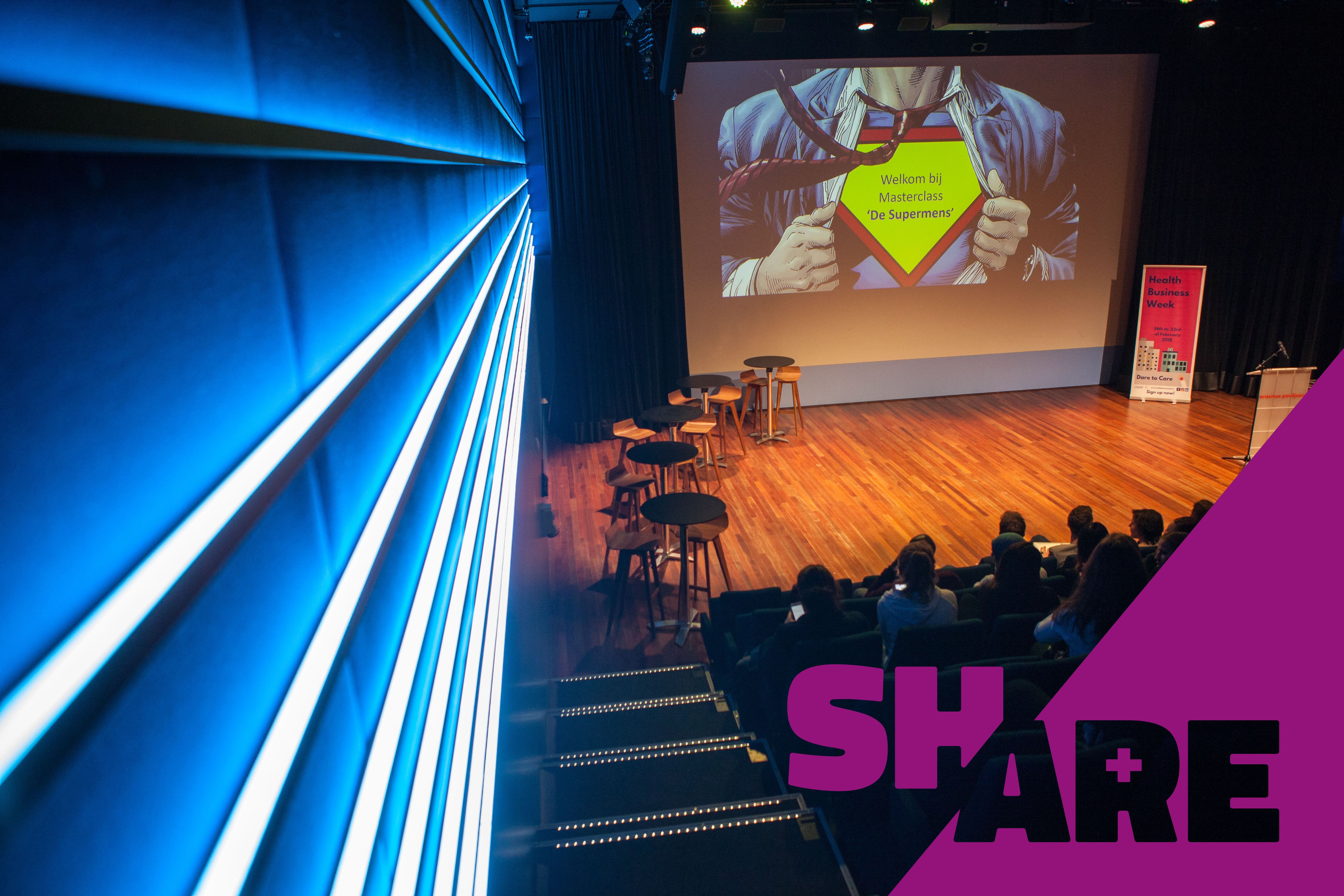Is being a superhuman realistic?
Can humans be super all the time? How about stress? And should technology become important in our daily lives and in the medical world? These questions and more were answered during a masterclass about superhumans. The speakers were Kirsten Nelis, Jorieke van Noorloos, Emma Westermann, Hannes Leroy and Peter Joosten.
Kirsten Nelis
Kirsten Nelis is an experience expert and a burn-out coach. Her talk was about what stress is, how to recognize it and she gave tips about how to avoid or get rid of stress. She described stress as an increased state of alertness. There are five stages of stress. The first is stress, which is felt sometimes at certain situations. Second is chronic stress, which is continuous stress. If you have chronic stress and do not do anything about it you will be overwrought, which is the third stage. When you slide down the hill even further, you will get burned out. You can recognize a burn-out by a list of 60 symptoms. There are physical, mental, behavioral and emotional symptoms. Examples are a headache, not being able to focus and being agitated.
But what can you do to avoid a burn-out? According to Nelis, you should make some space in your life. You should understand that you can not do everything at the same time. If you have reached this understanding, you can try to relax more. Do something that clears your head. Besides that, if you want to say yes to something, use your energy as an indicator. If you have enough energy, you can say yes. If you do not, just say no! Keypoint, you have to learn to say no.
Jorieke van Noorloos
Jorieke is an experience expert. Her idea about being and staying super is that you should let go that everything needs to be perfect. People should remember that you cannot do everything at once. It takes too much to have great study result, healthy social life, play sports and build a great resume all at once. Do not rush yourself too much. Social media also plays an important part in the idea that everyone has a perfect life and it always has to be perfect. But, remember that you do not know what happened behind the picture. Do not put too much value in social media. Last but not least, her advice is that not everything in your life has to be perfect and that others feel the same.
Emma Westermann
Emma Westermann makes documentaries and wrote the book ‘Millenium Manifest’. In 2016 she started making her own documentary alone about Pia Douwes. During this event she had moments of doubt. In the showbusiness she was afraid to let people in and talk about her feelings. She had the idea that everything needed to be perfect. During this event she talked to family and discovered that even people who seem very successful have moments of doubt, but that this should not give you the idea that you should give up. Being a superhuman is something that is impossible so you should do what makes you happy and if you succeed in that, that is super enough.
Hannes Leroy
Hannes Leroy is an assistant professor at Rotterdam School of Management. He is teaching students how they can prepare themselves for the high expectations they have to meet when becoming leaders. With these high expectations comes a lot of stress, so he teaches them how to take care if they experience stress.
He and a few others are developing a device that measures the heart variability. This says something about what is going on in the brain. When you experience stress for a longer period of time, it will buzz and let you know to take a step back. If you listen to this device, you will be able to prevent too much stress. But not only that is a selling point. They also want to make people more optimal. If you do not experience too much stress, you will be able to achieve more. It helps you become more of a superhuman!
Peter Joosten
Peter Joosten is an expert on subjects as the quantified self, biohacking and the impact of technology. He first told us about biohacking. Biohacking is about optimizing your life and body, with technology, biology and systems. He gave us a few examples of biohacking. First of all, it is possible to adjust genes. By adjusting genes, you can prevent babies from having certain diseases. He also told us about artificial intelligence. We are putting more and more human into technology. Robots are a great example for artificial intelligence. We are even trying to make robots proceed surgeries instead of actual surgeons. Lastly, he told us about human enhancement. We are not only putting more human in technology, but also more technology in humans. Peter Joosten has installed a chip in his hand where his business card is on.
Of course, all this raised some questions. Where do you draw the line? Do we want designbabies? Do we want chips that enhance our ability to think?
We think that everyone who joined this masterclass gained more understanding about burn-outs. They learnt that it is important to say no at some points. Also, we learned how we can literally be superhumans, by all sorts of technological innovations! It was an afternoon full of information which we still need to clear in our heads.
Written by Romy van Rooijen & Marit Segaar
Published: 6 March 2018
